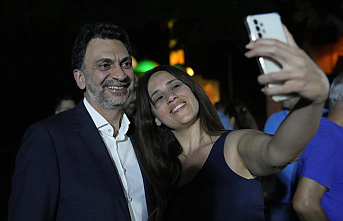Nearly three centuries ago, Hindus and Muslims in India's northern Varanasi have prayed to the gods in separate mosques and temples. It is seen as a sign of religious coexistence in a country that has suffered from deadly communal violence.
Due to a controversial court case, this coexistence is under threat.
An Indian group filed a petition to the Gyanvapi Mosque compound seeking permission to pray there. The petition was filed earlier this month by a local court. It claimed that the Gyanvapi was built on the remains of a medieval-era temple which was destroyed by a Mughal Emperor. The petitioners claim the complex still contains Hindu idols and motifs. However, this claim has been denied by the mosque authorities.
This legal battle is just one example of a growing trend in which Hindu groups petition courts to claim land that belongs to Hindus. Critics claim such cases raise concerns about the status of India's Muslims. This is a minor community that has been under attack by Hindu nationalists in recent years, who want to make India an officially Hindu nation.
Nilanjan Mukhopadhyay, an analyst and commentator on politics, stated that the idea of bombarding courts with petitions was to keep Muslims under control and the communal pot simmering. It is a way of telling Muslims that their public display in India of faith is not accepted anymore and that they should seek to redress the humiliation suffered by them from Muslim rulers in the medieval past.
In many ways, India's current religious strife is reflected in the court case concerning Varanasi's Gyanvapi mosque, a 17th-century Hinduism holiest city. It is widely believed that the mosque was built on top a temple to Shiva, which was destroyed by Aurangzeb, the Mughal ruler.
Both communities have always remained true to their claims, but they also tried to resolve the conflict. After five Hindu women had filed a petition asking permission to pray there, a Varanasi court ordered that the mosque be surveyed.
Hari Shankar Jain (a lawyer representing Hindu women) said that a video survey revealed a stone shaft believed to be a symbol for Shiva in a mosque reservoir used by Muslim devotees to ablution before offering prayers.
Jain stated that the land where the mosque was built belonged to Hindus. He should return it to them.
The claims were refuted by representatives of the mosque. Rais Ahmad Ansari (a lawyer representing the mosque's committee) stated that the alleged stone shaft found within the reservoir was the foundation of a fountain.
After discovering the alleged Hindu symbol, Varanasi's local court sealed the building and banned large Muslim groups from entering. The judgment was overturned by India's Supreme Court, which allowed Muslims to pray inside the mosque. It also directed local authorities to seal off the area where the shaft of stone was discovered, thereby removing Muslims from a section of the mosque that they had been using up until now.












